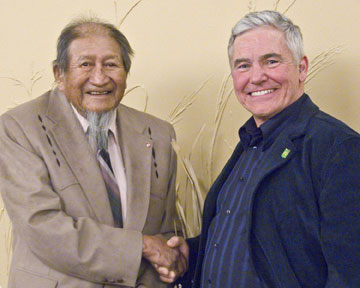Retiring Judge Reilly a ray of warm spring sunshine
COFFEE WITH WARREN, with Warren Harbeck
Cochrane Eagle, October 29, 2008
Former Stoney Nakoda Chief Bill McLean, left, expresses his gratitude to retiring Alberta Provincial Court Judge John D. Reilly for highlighting the wisdom of restorative justice programs among Canada’s First Nations peoples.
Photo by Warren Harbeck
While some gave only lip service to hearing the cry of the poor, he gave an ear of justice. And while others fawned over frocks and feathers, or had their silence bought with trinkets, trips, and status – or were controlled through fear – he challenged the very people and practices held to be responsible for the social poverty of a First Nations community, and accepted the possibility of losing his own position as the price for standing up for what is right and reasonable.
My treasured coffee companion Judge John D. Reilly, after 31 years with the Provincial Court of Alberta, retired recently from the bench, but hopefully not from his advocacy of just causes affecting the First Nations of Canada, and in particular, the people of the Stoney Nakoda First Nation, at Morley.
Many of his colleagues and friends gathered in Cochrane last Friday evening for a retirement dinner in honour of this man who brought international attention to the principles of restorative justice – a way of justice that seeks to restore the roots of a healthy and balanced community life instead of simply meting out punishment.
I first met John in 1997, around the time when, as circuit court judge for Banff-Canmore-Cochrane, he called for an investigation into allegations of political corruption at Morley. He likened the reserve to “a banana republic” that was depriving many of access to wellness programs and services that were their right, the depriving of which clearly undermined the wellbeing of the community as a whole. (See Sarah Junkin’s article, “Judge faces retirement,” in the Sept. 17, 2008, issue of the Eagle.)
Over the following years he established warm bonds of goodwill among the Stoney Nakoda people. He attended their gatherings of joy and sorrow, and sipped tea in the homes of many previously invisible to those on the bench. In so doing, he says, he came to understand the justice system through their eyes.
Among his guests at the honouring banquet were highly-respected elders from Morley, including former Chief Bill McLean, who led in an opening prayer, and programs coordinator Greg Twoyoungmen, who gave the opening address, praising John’s “wisdom, patience, kindness, understanding and gentleness.”
In John’s remarks at the close of the banquet, he stressed that “the Canadian justice system can be a positive force for change in our society, if it focuses on the results it wants to get.”
Alluding to what he has learned from First Nations traditions about healing circles, he said:
“We will not solve problems of today by the same mindset that got us into those problems. Punishment is not the best way to help people change. What we’ve been doing hasn’t been working very well. . . . My thinking has changed 180 degrees. . . . Fan the goodness in a person rather than punish the badness out.”
Behind all this, he said, was his passionate dream that “every child should have a safe and quiet place to sleep every night.”
There is an old saying: “None are so blind as those who will not see.” Judge John D. Reilly chose not to be blind. And in seeing much – and risking much – he set out to correct what he saw.
Thank you, Your Honour. You are a hope-filled ray of warm spring sunshine that melts a long winter’s snow.
© 2008 Warren Harbeck
JoinMe@coffeewithwarren.com
